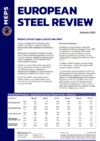EU to protect automotive sector with Chinese EV tariffs
The European Commission’s imposition of import duties of up to 48.1% on Chinese-built electric vehicles (EV) could help to protect long-term steel demand from the EU’s automotive sector.
A provisional ruling announced by the Commission today (June 12) revealed that duties of between 17.4% and 38.1% would be levied on vehicles depending on their producers’ level of cooperation with its antisubsidy investigation, which started last October. The tariffs would be applied in addition to the 10% rate already paid on Chinese cars imported into the EU.
The Commission said: “Should discussions with Chinese authorities not lead to an effective solution, these provisional countervailing duties would be introduced from 4 July by a guarantee (in the form to be decided by customs in each Member State). They would be collected only if and when definitive duties are imposed.”
A definitive vote by EU member states will be held in November. This will determine whether the new EV import duties will be adopted as definitive measures which would apply in the longer term.
The EU’s proposed tariffs follow the US Government’s move to impose a 100% tariff on EVs from China. Under the EU’s plan BYD, the world’s largest EV producer, would be subject to a 17.4% duty. Meanwhile, Geely (producer of Volvo and Polestar vehicles) faces 20% tariffs and MG producer SAIC the highest rate of 38.1%. Other “cooperating” OEMs will be subject to a 20% tariff.
Automotive: a key steel-consuming sector
MEPS International reported in last month’s European Steel Review on the growing importance of the EU automotive sector to the region’s steel industry.
The automotive sector accounts for around 17% of European steel consumption, according to Eurofer data. Europe’s carmakers are a crucial market for steelmakers’ green steel products.
MEPS’s May report said: “The EU’s Carbon Border Adjustment Mechanism (CBAM) does not protect against finished products such as cars. Consequently, the use of more cheaply produced steel may continue to provide Chinese imports with a price advantage. New duties, designed to level the playing field, could be key to the long-term strength of steel demand from Europe’s carmakers.”
Chinese-built vehicles have been increasing their share of the European new car market in recent years. In 2020, China’s global car exports totalled around one million units. This year, it is expected to export around six million vehicles to more than 140 countries worldwide, surpassing the volume of the current global leader, Japan. The European Commission believes Chinese vehicles’ EU market share could grow to 15% by 2025.
A recent study conducted by the Kiel Institute found that an extra 20% tariff on Chinese EVs would reduce imports by a quarter.

Source:
European Steel Review
The MEPS European Steel Review is an informative, concise and easy-to-use monthly publication, offering unique professional insight into European carbon steel prices.
Go to productRequest a free publication





